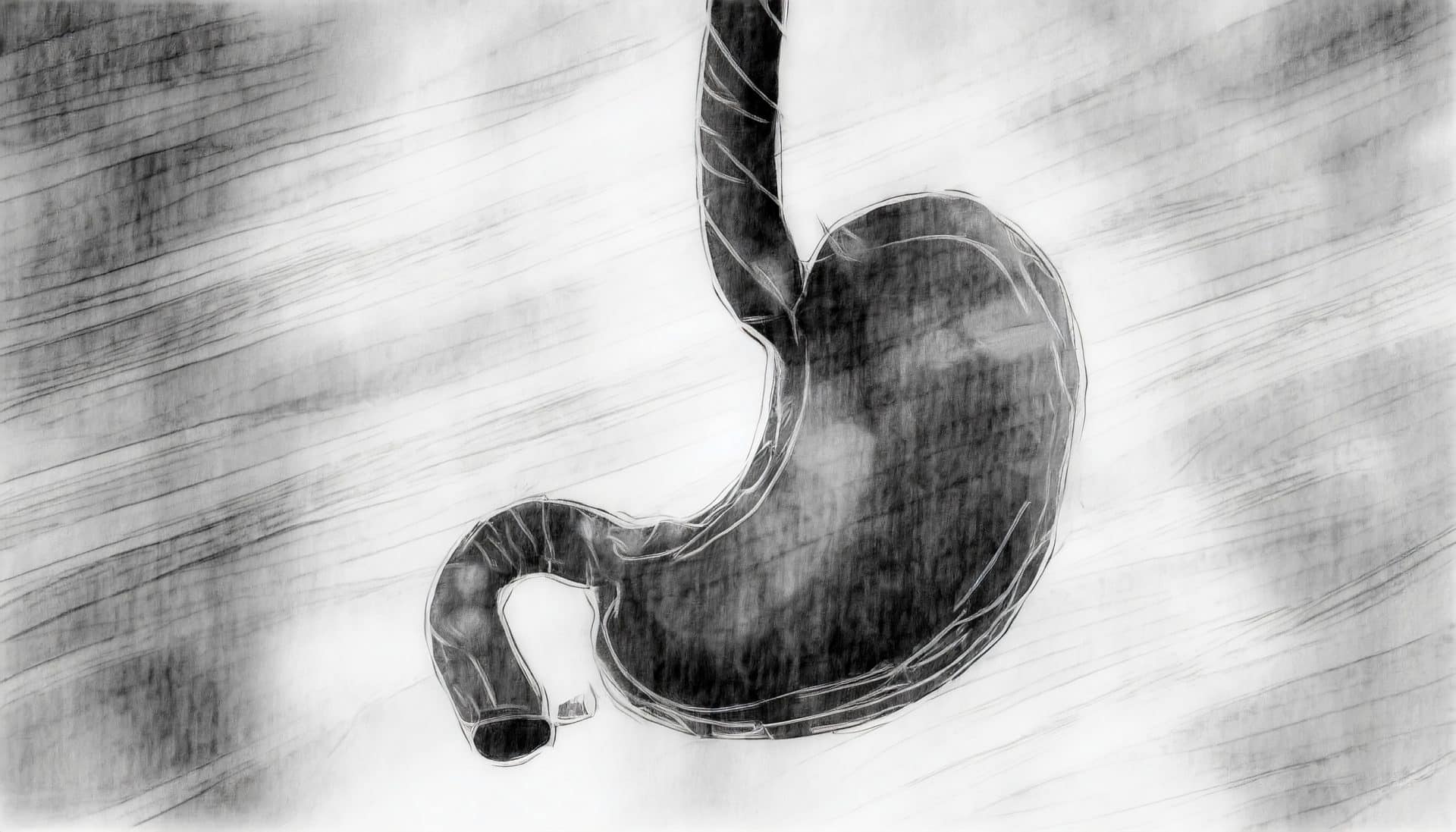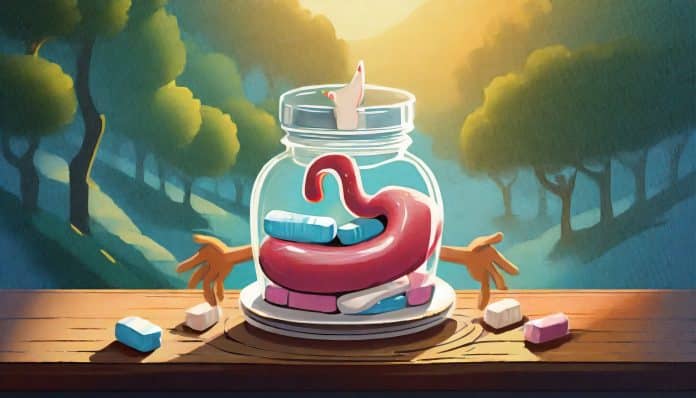So you’ve just enjoyed a minty stick of gum, but you’re not anywhere you can easily dispose of it. The temptation arises – what if you just swallowed it? Your mind might quickly flash to the age-old warning, immortalised in schoolyards across the country: “Don’t swallow your gum—it’ll stay in your stomach for seven years!” But is there any truth in this? Is it okay to swallow gum? We’re here to help you find the truth behind these chewy myths.
Remember, sometimes the things we’re told as kids aren’t always based on scientific fact!
Before we begin, knowing how our stomach works is useful to understand what potentially happens when you swallow gum. Here’s a quick, kid-friendly breakdown:
- Your stomach is a bit like a mixer. It uses acids and powerful muscles to break down what we eat and drink.
- Then, the small intestine takes over, pulling out all the goodies (like vitamins and minerals) our body needs.
- The leftovers are sent to the large intestine, and well… you know the rest.
Food takes 24 to 72 hours to pass through the digestive system.

The Myth: Gum Stays in Your Stomach for Years!
We’ve all heard this one before. Your aunt, teacher, or even mum or dad might have told you this: “If you swallow gum, it stays in your stomach for seven long years!” But is this true? Or is it just a myth? After all, sure, gum is a bit odd. It’s different from most food we eat because no matter how much we chew, it never seems to break down. But does this mean it’s settling in for a seven-year holiday inside your gut? Well, let’s see…
The Seven-Year Tale: Fact or Fiction?
If you believe the seven-year myth, swallowing gum by accident (or even on purpose!) can seem a little scary. But here’s the cheerful truth – It’s complete and utter tosh! Total codswallop!.
The human body is a remarkable thing, especially when it comes to processing what we eat and drink. Yes, even gum! While it’s true that our body can’t digest gum the same way it does an apple or a biscuit, this doesn’t mean it gets stuck inside us for years.
So, What Happens to Swallowed Gum?
In simple terms, the same thing happens to other stuff we can’t digest. Our bodies have a handy trick for dealing with such things. Let’s think about corn for a moment. Have you ever noticed how corn appears pretty much the same when it comes out as it did going in? That’s because our bodies can’t fully break it down. But this doesn’t mean it sticks inside us; our digestive system moves it along and out of the body.
The same is true for chewing gum. Though our stomach cannot break it down completely, the rest of our digestive system can move it along. So, of course, swallowed gum doesn’t stay around for seven years. It usually exits within a couple of days, just like that kernel of corn!
Is It OK to Swallow Gum?
Even though gum doesn’t stick around in your belly for years, it’s still not a great idea to regularly swallow it. Occasional accidents are fine (and unavoidable!), but remember, the gum is designed for chewing, not chomping down and swallowing like a piece of chocolate. It’s not harmful if it happens occasionally, but it’s not something you should make a habit of. So next time you finish with your gum, best to pop it in a bin, not your tummy!
The stomach produces about 2 litres of gastric juice every day.

Meet Your Mighty Stomach: A Food-Breaking Powerhouse
The stomach is pretty ace when breaking down most things we chomp. It’s like a food magic trick! But what about gum?
The Stomach’s Acidic Superpower
Your stomach is filled with a remarkable juice called stomach acid. It’s so strong it could even dissolve a nail! But not even this superhero acid can break down the synthetic rubbery stuff gum is made of. It’s a bit like if Superman met a material completely immune to his powers. Frustrating, huh?
Gum’s Incredibly Hardy Nature
Chewing gum’s tough nature comes from a synthetic base. We often compare it to natural rubber, Like the stuff your bicycle tyres are made of. That’s why it’s so bendy and bouncy!
But swallow it, and your stomach will have a tough time. This rubber base doesn’t break down in the stomach’s acid. It’s not quite invincible, though. Your body still has a clever plan to deal with it.
Kicking Gum Out of the System
When you swallow gum, something marvellous happens. Your stomach can’t break it down, so it wraps it up with other hard-to-digest stuff. It then sends it through your digestive system, almost like a farewell party, but without cake. And it usually exits your body during a visit to the loo within a few days. There you have it. It’s not a seven-year stay! Instead, gum is a brief visitor to your body’s magical world.
Can Anything Stay in Your Stomach for Seven Years?
Well, not really. Not even an item made of plastic or metal. Your body simply isn’t designed to store something that it can’t digest for this long!
Your stomach says – “I don’t know what this is or what to do with it, so I’m just going to push it out!”
So, that’s the journey of a piece of swallowed gum for you. A guest, but not a long-term tenant in your body. It’s not as scary as the Tall Tales might have you believe.
Contrary to popular belief, gum does not stay in the stomach for seven years if swallowed.

Deciphering Fact from Fiction: An Exercise in Truthfulness
You may be curious how to differentiate between truth and myth regarding facts like these. Well, it’s simpler than you might think! Here are some steps you can follow to get to the bottom of cool beliefs and legendary tales:
- Ask Questions: Be inquisitive, like you’re asking about swallowing gum. Always seek explanations and evidence about what you hear. Phrases like ‘Is that true?’ and ‘Where did you hear that?’ encourage others to check their facts too.
- Do Some Research: After asking questions, you could dig deeper into the topic. Look out for reliable sources of information, like well-regarded science websites, encyclopedias, or even good old trusted books from the library.
- Consider the Source: When conducting your investigation, always consider the source. Is it from an expert, a trusted organisation, or someone sharing an opinion without much evidence? Trustworthy sources can back their claims with facts, research, and logic.
- Consult Adults for Clarification: If you’re ever stuck or unsure, speak to an adult you trust, like your parents, a teacher, or a librarian. They can help you distinguish myths from facts, and they might even learn something new from your questions! And remember. Adults are not always right!
- Be Patient: It’s sometimes challenging to tell fact from fiction, especially with many fanciful stories floating around. But patience is key. The truth is out there; you’ve just got to keep looking!
- Keep Asking Questions: Just because you have learnt something new, it never hurts to keep an open mind to the possibility that you might later find out new information that allows you to discover something new and requires you to change your mind again. That’s how we learn!
Remember, it’s fantastic to question and learn. You might even debunk a myth others have believed for years!

